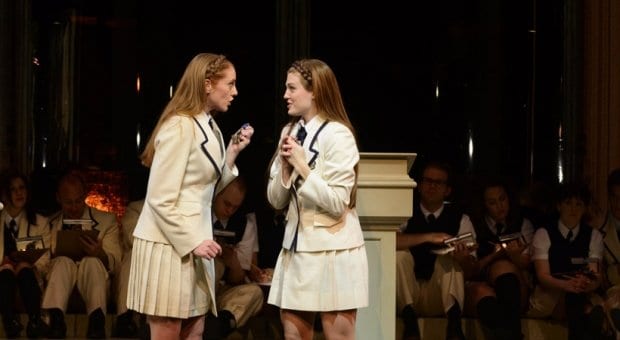Così Fan Tutte, ossia La Scuola degli Amanti (1790) (All Women Are Like That: A School for Lovers)
Music by WA Mozart
Libretto by Lorenzo Da Ponte
Conductor Johannes Debus, stage director Atom Egoyan
What happens? Two young officers at a coffee house extol the virtues of their fiancées to an older man they just met. To test their assertions (“a faithful woman is like a phoenix — everyone swears it exists, nobody has seen it,” he contends), the old philosopher proposes a bet. The young men agree to pretend to have been called to war, deliver a tear-drenched farewell to their lovers, and reenter their lives disguised as handsome foreigners who proceed to seduce them. They have switched — each is on a mission to conquer the other man’s lover. The philosopher plots and schemes in cahoots with the sisters’ maid. None of this ends well, despite the perfunctory happy ending.
Why should you go? It’s one of the most puzzling operas ever made, and that’s saying something. Some argued that for Mozart and Da Ponte Così was a quick and dirty farce into which neither put too much thought. Even if that was the case, the work reads as if it was made for our own epoch, so love-wise and wizened by the psychoanalysis, the sociology of love and the historicizing of marriage and courtship. How does love work, anyway? Can we only ever love narcissistically — because the other person returns a flattering image of ourselves? (Ferrando & Guglielmo illustrate this well.) What proofs do we consider valid that the other loves us back? (Promises, oaths, performative words, the I dos all matter very much, and in this, as in their focus on sexual exclusivity, the two men are also our contemporaries.) What if each declaration of love comes with a built-in timer? (Since Così is brutal, it takes the girls the whole of 24 hours to stop loving.) Marital arrangements have always been a negotiation between practical and emotional concerns, and the romantic love, with emotional fulfilment as the deal-breaker, is a relatively new phenomenon. Così is almost exclusively about the emotional deal-breakers and not about the practical stuff.
Da Ponte’s Così is related to Marivaux, de Laclos, maybe even de Sade. Expect all your tender bits to be found and probed.
How much is the lead soprano tortured? None of that woman-torturing nonsense in Mozart. And although on first sight this may appear to be a rare Mozart opera that takes side against its women, its two male protagonists are worse: even more easily manipulated, even more vain and even more vapid than the sisters. The only two characters with agency are the mysterious Don Alfonso (who is this guy? Don Giovanni in retirement?) and the maid Despina, who crossdresses as various authority figures in the course of the opera.
What to look for in the music? This most cynical of operas is replete with beautiful music, in the worst possible sense of that term. Heart-achingly beautiful melodies, in solos, duos or trios, accompany equally the acts of deception, parody, betrayal, vanity, selfishness, as the rare moments of genuine feeling. There are too many hits to choose from, but if I had to, let’s make it “Soave sia il vento,” which the women sing with Don Alfonso as the men depart. It is a break between the songs of innocence and the songs of experience, it turns out.
Conversation starter at the intermission: “So . . . how was it when you had your heart broken for the first time?” On second thought, no. Make that: “Red or white?”
Così Fan Tutte, ossia La Scuola degli Amanti runs until Fri, Feb 21.
Four Seasons Centre, 145 Queen St W.
coc.ca

 Why you can trust Xtra
Why you can trust Xtra


